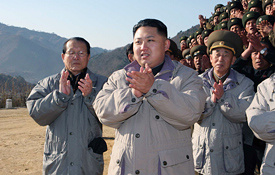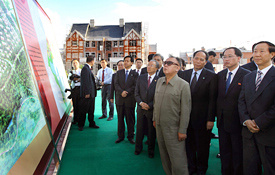 |
 |
|
YOUNG LEADER: Kim Jong Un (center), North Korea's new leader and then Vice Chairman of the Central Military Commission of the Workers' Party of Korea, visits a hydropower plant in northern part of the country in early November 2011 (XINHUA/KCNA) |
GOOD NEIGHBORS: North Korean leader Kim Jong Il visits a residential area under construction in August 2011 in Daqing, Heilongjiang Province (LAN HONGGUANG) |
Considering the orderly process of power succession, the new North Korean Government will face major economic challenges instead of political ones. The new leader also needs to pay special attention to solving livelihood problems caused by long-term economic difficulties after the Cold War, so as to guarantee political stability in the country.
During the Cold War from the late 1940s to the early 1990s, North Korea's economy was functional because it benefited from support from other socialist countries. However, North Korea lost its external support after the disintegration of the Communist bloc in 1991. It was excluded from Northeast Asia's reconciliation process due to complicated internal and external reasons. As a result, its economic opening up in the early 1990s failed. Kim Il Sung, founder of North Korea, died in 1994. In the years that followed, North Korea was hit by devastating natural disasters, and its grain output greatly decreased. The confluence of bad luck beat the country's economy down, and the country was mired in difficulties.
At that time, some countries believed North Korea's new administration under Kim Jong Il couldn't survive all the difficulties, expecting changes within North Korea. This increased North Korea's anxiety for the security of its external environment. Therefore, the songun (military-first) policy started to dominate all Pyongyang's decisions. The country's economic recovery and development inevitably were limited as most of its resources were used for national defense.
The third-generation leader of North Korea now faces a much better internal and external environment than when Kim Jong Il took power. First of all, due to rapid progress in national defense in the songun era, the country's self-confidence in security has strengthened. Second, North Korea's economic conditions have improved over the past years. Third, China's rising economic strength offers North Korea much better external support than before.
What Pyongyang now needs is a clear development plan. North Korea can take experiences of China, Viet Nam, Myanmar as well as other developing countries in Southeast Asia, Latin America and Africa as a reference.
North Korea's past dream of "opening a door to a more prosperous, powerful country" by 2012 obviously is unrealistic. But if the new leader can jump out of the old mode, North Korea will get the opportunity to drive on the freeway of economic development.
Being a country in the center of geo-political twists, North Korea can never ignore the influences of the external environment on its domestic political and economic development.
Pyongyang found itself trapped in a security dilemma as it tried to avoid damage caused by the adjusted international relationship structure after the end of the Cold War. The nuclear issue was the main cause for this dilemma.
North Korea mapped out a plan of developing nuclear power on a large scale in the mid-1980s, when its economic conditions were fairly good. It participated in the Nuclear Non-Proliferation Treaty, but didn't sign required security agreements, which triggered conflicts between Pyongyang and Washington on the nuclear issue.
| 